Also available in Contemporary Studies in Philosophy and the Human Sciences
Series Editors: Hugh J. Silverman and Graeme Nicholson
Before Ethics
Adriaan Peperzak
Beyond Metaphysics
John Llewelyn
The Deconstruction of Time
David Wood
Dialectic and Difference: Modern Thought and the Sense of Human Limits
Jacques Taminiaux
Elucidations of Holderlin's Poetry
Martin Heidegger Translated by Keith Hoeller
God and Being: Heidegger's Relation to Theology
Jeff Owen Prudhomme
Heidegger and the Question of Time
Francoise Dastur Translated by Francois Raffoul and David Pettigrew
Heidegger and the Subject
Francois Raffoul Translated by David Pettigrew and Gregory Recco
History of Hermeneutics
Maurizio Ferraris
Illustrations of Being: Drawing upon Heidegger and upon Metaphysics
Graeme Nicholson
In the Presence of the Sensuous: Essays in Aesthetics
Mikel Dufrenne Edited by Mark S. Roberts and Dennis Gallagher
The Language of Difference,
Charles E. Scott
Language and the Unconscious Jacques Lacan's Hermeneutics of Psychoanalysis
Hermann Lang
Martin Heidegger's Path of Thinking
Otto Pdggeler
Michel Foucault's Force of Flight: Toward an Ethics for Thought
James WBernauer
The Paths of Heidegger's Life and Thought
Otto Pdggeler
Political Philosophy at the Closure of Metaphysics
Bernard Flynn
The Question of Language in Heidegger's History of Being
Robert Bernasconi
Rationalities, Historicities
Dominique Janicaud Translated by Nina Belmonte
Sensation: Intelligibility Is Sensibility
Alphonso Lingis
Structuralism: A Philosophy for the Human Sciences
Peter Caws
The Incarnate Subject: Malebranche, Biran, and Bergson on the Union of Body and Soul
Maurice Merleau-Ponty
Texts and Dialogues
Maurice Merleau-Ponty
Utopics: The Semiological Play of Textual Spaces
Louis Marin
Edited by Walter Biemel and Hans Saner
Translated by
GARY E. AYLESWORTH






 he history of German philosophy is the history of philosophy professors, and the letters contained in this volume are written by two of the foremost among them. Because the academic and philosophical context of the exchange of letters between Martin Heidegger and Karl Jaspers might be unfamiliar to a general reader, I offer some background in order to facilitate a clearer understanding of the correspondence and documents presented here.
he history of German philosophy is the history of philosophy professors, and the letters contained in this volume are written by two of the foremost among them. Because the academic and philosophical context of the exchange of letters between Martin Heidegger and Karl Jaspers might be unfamiliar to a general reader, I offer some background in order to facilitate a clearer understanding of the correspondence and documents presented here.
In the letters, one is immediately confronted with references to academic ranks, titles, and procedures that are unfamiliar to an American audience; this holds as well for the division and organization of the academic faculties. The following description will characterize the German university of the 1920s, the time of the most intensive correspondence between Heidegger and Jaspers, and the most formative period of their philosophizing. Many of its features still hold today.
The German university is divided into four faculties (more or less equivalent to those in American universities) each headed by a Dean (Dekan): medicine, law, theology, and philosophy. The first three are concerned with professional training in their respective areas, and the philosophy faculty contains the liberal arts and sciences, including, of course, philosophy as a separate discipline. It should be noted, however, that when reference is made to the philosophy faculty, any number of disciplines may be meant, e.g., ancient history or economics.
Another concern is the order of academic ranks. These designations derive from the Prussian General Code of 1794 and the Disciplinary Law of 1852, and are arranged as follows: a Professor Ordinarius draws a regular salary from the Ministry of Culture with a rank equal to a Councillor of State 4th or 3rd class, and is also compensated with lecture and examination fees paid by the students; a university Rector (President) holds a rank and draws a salary equal to a Councillor of State 2nd class; a Professor Extraordinarius also draws a regular salary from the Ministry with a rank equal to a Councillor of State 5th class, and is also compensated with student fees; a Privatdozent (Lecturer) is not a government official and does not enjoy a regular salary but is compensated with lecture fees alone. The Dozent has earned the right to teach at a university, the venia legendi, by completing the doctoral degree and then writing a second, qualifying dissertation-the Habilitation. In addition to these designations, a very distinguished professor may be rewarded with an even higher personal title, e.g., Gebeimrat (Privy Councillor). Needless to say, those who hold the rank of Professor Ordinarius enjoy much more power, security and prestige than a mere Dozent.

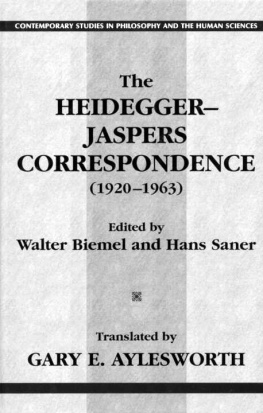
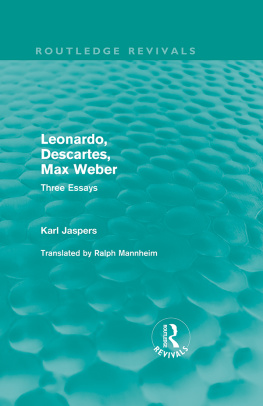
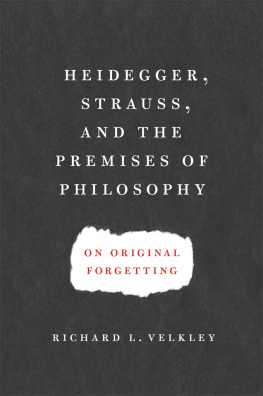
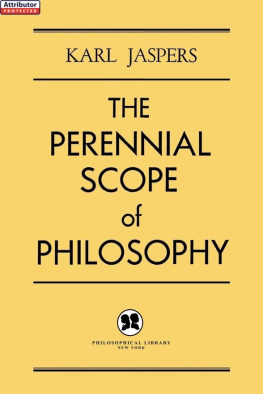


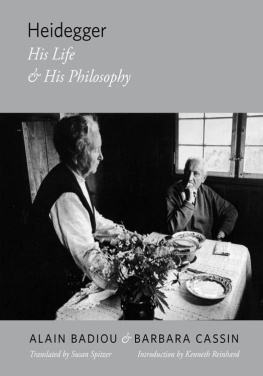

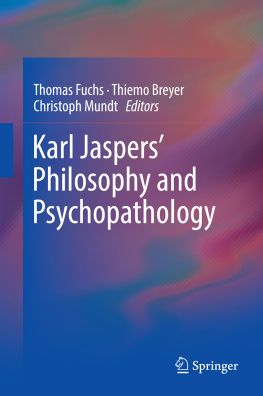
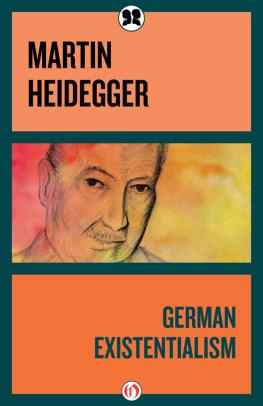
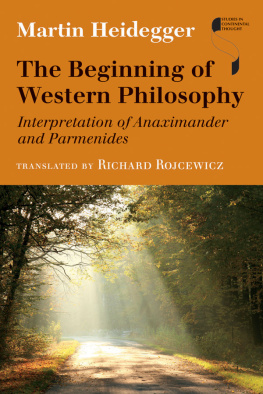
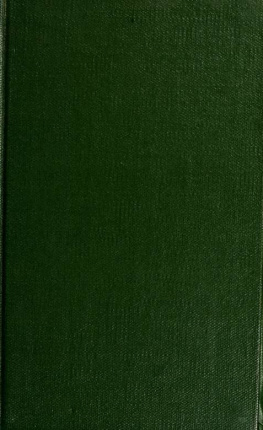










 he history of German philosophy is the history of philosophy professors, and the letters contained in this volume are written by two of the foremost among them. Because the academic and philosophical context of the exchange of letters between Martin Heidegger and Karl Jaspers might be unfamiliar to a general reader, I offer some background in order to facilitate a clearer understanding of the correspondence and documents presented here.
he history of German philosophy is the history of philosophy professors, and the letters contained in this volume are written by two of the foremost among them. Because the academic and philosophical context of the exchange of letters between Martin Heidegger and Karl Jaspers might be unfamiliar to a general reader, I offer some background in order to facilitate a clearer understanding of the correspondence and documents presented here.